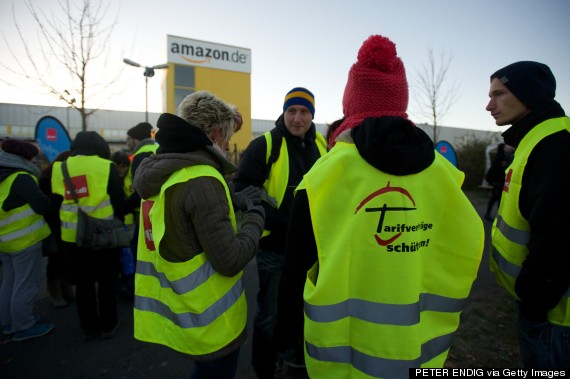
If you plan on looking for online deals this Black Friday -- and if 2013 is anything like 2012, more than 57 million Americans will -- you’ll likely visit a little website called Amazon.com. From the outside, the world’s largest online store works like magic: Click a button and in few days, some chosen item will miraculously show up at your doorstep.
But unlike the greeters at Walmart or the cashiers at Target, you’ll likely never meet the men and women who box your Amazon order at one of the company's gargantuan warehouses across the globe. And Amazon may prefer it that way, since its online prices end up having huge costs.
A few things to keep in mind this shopping season:
1. Warehouse workers are treated like robots.
Your boss may be bad. But your supervisor probably isn't a piece of equipment that times you as you complete menial tasks. This week, the BBC described the experience of one of its undercover reporters, Adam Littler:
A handset told him what to collect and put on his trolley. It allotted him a set number of seconds to find each product and counted down. If he made a mistake the scanner beeped.
"We are machines, we are robots, we plug our scanner in, we're holding it, but we might as well be plugging it into ourselves", he said.
"We strongly refute the charge that Amazon exploits its employees in any way," the company said in a statement responding to the BBC report.
2. Amazon doesn’t pay workers for every hour they work.
To make sure low-wage warehouse workers don't steal any merchandise, Amazon makes them pass through security checkpoints. Here’s what one Nevada worker experienced:
Whenever he clocked out after his 12-hour shift at an Amazon warehouse, Jesse Busk had one more critical task to perform before he could hop into his car and head home to sleep: Pass through the sprawling warehouse security checkpoint.
The purpose of the checkpoint was to prevent workers like Busk from pilfering electronics or other pricey goods from the Amazon stock. The process deeply annoyed Busk, but not because of any indignity he may have felt in being checked for contraband. What bothered him was the time it required after an exhausting day -- up to 25 minutes, all of it unpaid.
Amazon has declined to comment on worker lawsuits over the lost pay.
3. Warehouses are so big that workers waste their lunch hour just walking to the cafeteria.
Again, from the Nevada warehouse:
According to the lawsuit, the facilities they worked at were each the size of seven football fields. On an unpaid lunch break, Busk said he might spend half the time just trying to get to and from the area where workers eat.
An image from the warehouse, to get a sense of how big we're talking:

Amazon has declined to comment on the issue.
4. Sometimes warehouses are so hot, people pass out.
The now famous case occurred in an eastern Pennsylvanian warehouse. The Morning Call, the daily newspaper in Allentown, Pa., tells the tale of warehouse employee Elmer Goris:
The 34-year-old Allentown resident, who has worked in warehouses for more than 10 years, said he quit in July because he was frustrated with the heat and demands that he work mandatory overtime. Working conditions at the warehouse got worse earlier this year, especially during summer heat waves when heat in the warehouse soared above 100 degrees, he said.
He got light-headed, he said, and his legs cramped, symptoms he never experienced in previous warehouse jobs. One hot day, Goris said, he saw a co-worker pass out at the water fountain. On other hot days, he saw paramedics bring people out of the warehouse in wheelchairs and on stretchers.
Only many months later did the paper report that air conditioning had been installed.
Amazon told The Morning Call in 2012 that new warehouses would be air conditioned and old ones would be retrofitted.
5. Amazon lets former workers go without unemployment benefits.
The Allentown newspaper stayed on Amazon's case, uncovering in 2012 that Integrity Staffing Solutions, the temp work agency Amazon uses to staff its warehouses, takes pains to make sure former employees can't collect unemployment benefits:
Months after she suffered heat exhaustion and lost her job in an Amazon.com warehouse in Breinigsville, Rosemarie Fritchman sat in a small conference room pleading for unemployment benefits of about $160 a week.
Opposing her at the hearing before a state referee, who would decide whether Fritchman was eligible for the benefit, was a human resources agent representing her employer.
The testimony of Gwen Golbreski, the human resources representative, was brief and procedural: "She was terminated for attendance," said Golbreski, who attended multiple hearings involving Amazon warehouse workers that day. "We have a no-fault attendance policy."
Fritchman, 67, remained poised and gave a detailed account about how she struggled working in brutal heat until medical personnel examined her and told her to go home. Following company policy, she provided a doctor's note upon returning to work, and she was still terminated without explanation, she said.
Amazon has declined to address its staffing provider's unemployment disputes.
6. Amazon hates unions.
Each of the above are really symptoms of one larger problem. Amazon executives categorically oppose the idea of warehouse workers organizing because they fear that unions would slow the speedy deliveries that have become the staple of the Amazon shopping experience. From The New York Times:
Dave Clark, the company’s vice president of worldwide operations and customer service, says Amazon views unions as intermediaries that will want to have a say on everything from employee scheduling to changes in processes for handling and packaging orders. Amazon prizes its ability to quickly introduce changes like these into its warehouses to improve the experience of its customers, he said.

